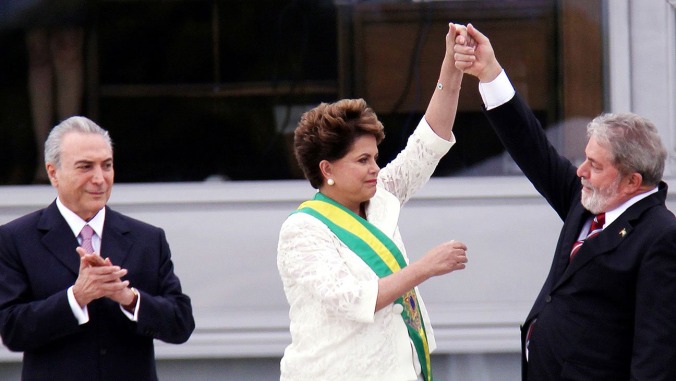The Edge Of Democracy offers an outraged but skimpy primer on Brazil’s recent political woes

When Brazilian director Kleber Mendonça Filho presented his 2016 feature Aquarius at the Cannes Film Festival, he and his crew took to the red carpet with signs that read “Brazil is not a democracy anymore” and “The world cannot accept this illegitimate government.” The protest—staged in solidarity with Brazil’s then-president Dilma Rousseff, who was being forced out on shaky charges—put a spotlight on the sociopolitical upheavals then sweeping the country. The new Netflix documentary The Edge Of Democracy aims to do the same for a (potentially) wider audience, laying out the chain of events of which Rousseff’s impeachment was a part, leading up to the current regime of far-right president Jair Bolsonaro.
Directed by Petra Costa (not to be confused with Portuguese director Pedro Costa), the documentary first provides a rundown of Brazil’s 20-year military dictatorship (which lasted until 1985), and the hard-won era of democracy that followed. From there, it chronicles the rise and fall of the two most recent Workers’ Party presidents: the once immensely popular Luiz Inácio Lula da Silva (referred to by his man-of-the-people moniker “Lula”), who is currently serving a prison sentence for contested allegations of corruption; and the aforementioned Rousseff, Lula’s successor, who became Brazil’s first female head of state in 2011. In particular, The Edge Of Democracy delves into the tumultuous fallout of Operation Car Wash, a sweeping anti-corruption investigation that implicated numerous Brazilian politicians and the multi-national petroleum corporation Petrobras.
The Edge Of Democracy is, transparently, pitched at viewers unfamiliar with Brazil’s recent past—which makes its global Netflix platform ideal. And there’s certainly value in seeing so much disparate material—archival footage, mainstream news clips, original footage of protests and demonstrations—briskly edited together. But the documentary’s scope is so vast, and its subject so dense, that it ends up skimping on details that a lengthy written article would likely lay out more clearly. In delving into the impeachment proceedings, for example, Costa understandably places emphasis on the unjust political machinations of Brazil’s Lower House, but also glosses over the failures of Rousseff’s government and its incontrovertible manipulation of the federal budget. Likwise, when dealing with the corruption charges against Lula—which painted him as the mastermind of the Car Wash scandal, but with the evidence revolving around a single triplex apartment he allegedly received as a bribe—Costa notes that there were “troubling” signs that he received special favors from contractors, but merely wishes that the prosecutors would have convinced her of his guilt or innocence, instead of “making a spectacle to present their case.” When the film quickly moves on, the details of the case are no clearer than before, and all we are left with is (justifiable) indignation at the absurdity of Brazil’s legal process.
The lack of comprehensiveness can be frustrating and counterproductive; far from undercutting the film’s position, offering a full, honest exploration of these subjects might have buttressed it. At least Costa invigorates the proceedings some by pulling from the cinematic grammar of political conspiracy thrillers—a strategy that Laura Poitras put to great effect in her Edward Snowden documentary Citizenfour. But the tension created by such stylization is frequently negated by passages of intrusive, florid voice-over commentary from Costa, in what amounts to the film’s personal, ruminative angle. At their limited best, these asides conflate her family’s internal rifts with the nation’s political divide. At worst, they just find Costa noting that she and Brazil’s democracy are about the same age (she thought they’d both be “on solid ground” in their 30s) or mentioning how a situation with interim president Michel Temer, who took office after Rousseff was removed, reminded her of Shakespeare’s Julius Caesar.
The Edge Of Democracy could clearly have been more than a bland journalistic footnote or a mediocre essay film. Costa has an astonishing level of access to both Lula and Rousseff, who are both seen in close-quarters footage at crucial points in the film’s timeline. (There’s even a passage where she and her mother meet up with Rousseff at her residence.) But instead of capitalizing on this advantage by exploring the former presidents’ compromises and failures, the filmmakers seem content with presenting unilluminating sound bites that often reiterate what is already known, spell out what is easily surmised, or just stoke a viewer’s rage at the injustices referenced therein.
It’s unlikely that The Edge Of Democracy could have been as enmeshed in the present-tense unfolding of Brazil’s history as Citizenfour was in the Snowden affair; the latter was a kind of rare, unrepeatable confluence of fortuitous circumstance and filmmaking vigor that’s impossible to repeat. Even by more conventional standards, though, The Edge Of Democracy is a decidedly missed opportunity. Still, there’s a measure of value in the film’s transparently partisan perspective. In a media climate plagued by false equivalencies and misguided attempts at journalistic objectivity, the righteous indignation of Costa’s account can be bracing. But indignation, however justified, can only accomplish so much.